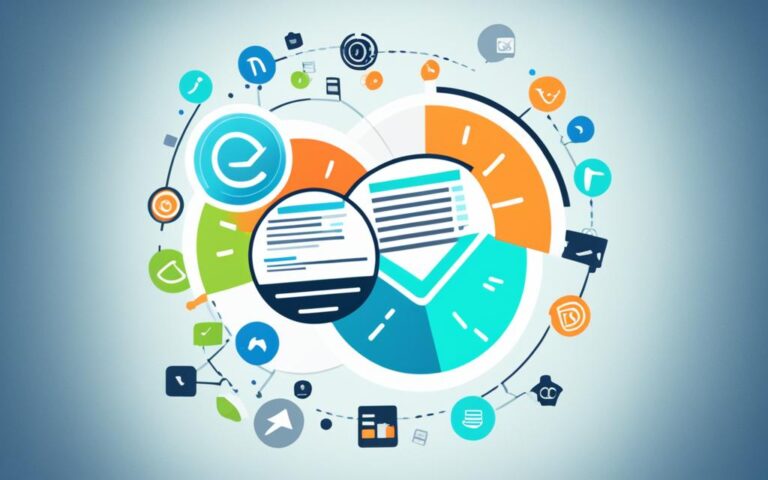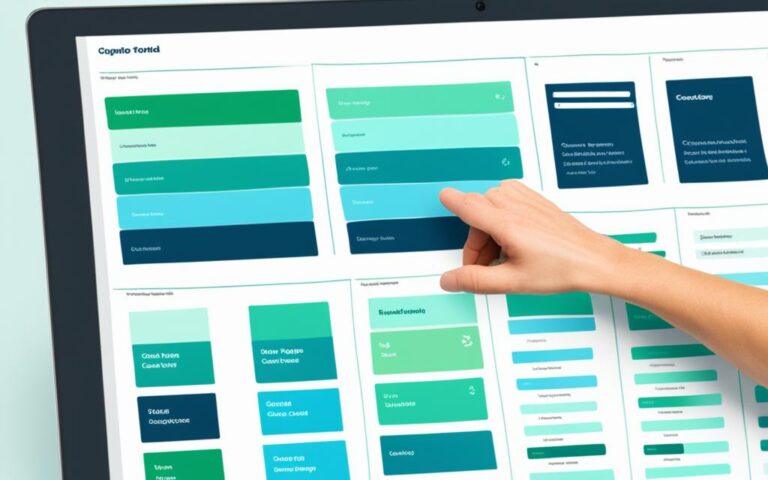Implementing Chatbots for Enhanced Customer Service
Did you know that over 80% of businesses are planning to implement chatbots for customer service by the end of 2022? The rapid growth of chatbot technology is revolutionizing customer interactions and paving the way for enhanced customer service experiences.
Chatbots, powered by artificial intelligence (AI), offer automated responses and act as virtual assistants, enabling businesses to engage with customers more effectively and streamline support processes. By harnessing the power of chatbots, companies can provide instant support, personalized recommendations, and efficient service, leading to improved customer satisfaction and increased loyalty.
In this article, we’ll explore the history of customer service chatbots, the various ways businesses can use chatbots to enhance customer service, and the future trends of this evolving technology.
Key Takeaways:
- Chatbots offer a versatile solution for enhancing customer service and streamlining support processes.
- Businesses can use chatbots to provide instant customer support, personalized recommendations, efficient order processing, and more.
- The future of customer service chatbots lies in continuous AI improvement, leading to enhanced user experiences and improved efficiency.
- Using chatbots can bring benefits such as 24/7 support, personalization, cost reduction, and improved customer engagement.
- Chatbots excel in 24/7 customer support, providing instant responses and reducing wait times.
A Brief History of Customer Service Chatbots
Customer service chatbots have a rich history that dates back to the 1960s. It all began with early automated response systems that used voice synthesizing technologies to interact with customers. These systems, known as interactive voice response (IVR), laid the foundation for the development of rule-based chatbots.
As technology advanced, chatbots evolved with the introduction of natural language processing (NLP) and machine learning (ML). These advancements enabled chatbots to understand and interpret human language, making them more intelligent and capable of delivering personalized customer experiences.
Today, we have omni-channel AI-powered chatbots that are widely employed across various platforms and channels. These chatbots integrate seamlessly into businesses’ customer support systems and provide a consistent, efficient, and personalized experience to customers.
Throughout their journey, customer service chatbots have played a pivotal role in transforming the way businesses interact with their customers. They have become an indispensable tool for enhancing customer support processes and streamlining operations.
Next, we will explore the different ways in which chatbots can be utilized to improve customer service. But before that, let’s take a closer look at the key milestones in the development of customer service chatbots:
- 1960s: Early automated response systems introduce voice synthesizing technologies.
- 1970s: Interactive voice response (IVR) systems pave the way for rule-based chatbots.
- 2000s: Natural language processing (NLP) and machine learning (ML) advancements enable chatbots to understand human language more effectively.
- 2010s: Omni-channel AI-powered chatbots become mainstream, offering comprehensive support across multiple platforms and channels.
Now that we have explored the brief history of customer service chatbots, let’s dive deeper into the various ways in which businesses can leverage these AI-powered assistants to enhance their customer service operations.
11 Ways to Use Chatbots to Improve Customer Service
Chatbots have become indispensable tools for businesses to enhance their customer service operations. With their ability to provide instant customer support, personalized recommendations, efficient order processing, automated appointment scheduling, and more, chatbots offer a multitude of benefits.
Instant Customer Support
Implementing chatbots enables businesses to offer instant customer support round the clock. Customers no longer have to wait for human agents to address their queries and concerns. With chatbots, they can receive immediate responses and solutions to their problems, ensuring enhanced customer satisfaction.
Personalized Recommendations
Chatbots can analyze customer behavior and preferences to deliver personalized recommendations. By understanding individual needs and preferences, chatbots can suggest products or services that are most relevant to each customer, increasing the chances of making a sale or providing a satisfying experience.
Efficient Order Processing
Integrating chatbots into order processing systems streamlines the buyer’s journey. Customers can place orders, make payments, and track deliveries directly through chatbot interactions. By eliminating the need for human intervention, chatbots improve the efficiency and transparency of the ordering process.
Automated Appointment Scheduling
Chatbots can automate the appointment scheduling process, saving time and resources for businesses. Customers can book appointments, check availability, and receive confirmation without human intervention. The chatbot can even send reminders to customers before scheduled appointments, reducing no-show rates.
Lead Generation and Qualification
Using chatbots for lead generation and qualification allows businesses to engage potential customers and capture crucial information. By asking targeted questions, chatbots can identify and qualify leads, ensuring highly valuable interactions and enabling businesses to allocate resources effectively for higher conversion rates.
Proactive Customer Engagement
Chatbots can initiate proactive conversations with customers based on triggers such as abandoned carts or browsing patterns. By reaching out with personalized messages and offers, chatbots can recover lost sales and build stronger customer relationships. Proactive customer engagement showcases exceptional service and strengthens brand loyalty.
Interactive Tutorials and Onboarding
Chatbots can guide customers through product tutorials and onboarding processes, providing step-by-step instructions and answering common questions. By offering interactive tutorials, chatbots ensure a seamless and informative experience for users, reducing the need for human intervention in the learning process.
Integration with Messaging Apps
AI-powered chatbots can be integrated into messaging apps, making customer interactions more convenient and accessible on platforms that customers already use. By being present on popular messaging apps, businesses can provide seamless support directly within the customer’s preferred communication channel.
Language Support and Translation
Chatbots equipped with language support and translation capabilities can cater to customers from diverse linguistic backgrounds. By automatically translating messages or offering multilingual interfaces, chatbots break down language barriers and ensure effective communication and support for all customers.
Feedback Collection and Surveys
Chatbots can be utilized to collect valuable feedback and conduct surveys. By engaging customers in conversation, chatbots can gather feedback on products, services, and overall customer experience. Gathering feedback through chatbots provides businesses with actionable insights for continuous improvement.
These are just some of the ways businesses can leverage chatbots for improving customer service. By implementing chatbots strategically, businesses can enhance efficiency, provide personalized experiences, and ensure customer satisfaction.
The Future of Customer Service Chatbots
The future of customer service chatbots is shaped by evolving AI technology, paving the way for continuous improvement in delivering an enhanced user experience and improved efficiency. As AI continues to advance, chatbots will become increasingly intelligent, capable of understanding and handling complex queries with ease.
Chatbots, powered by evolving AI technology, will have the ability to seamlessly collaborate with human agents, creating a hybrid customer support model that combines the strengths of both automation and human interaction. This collaboration will enhance the overall customer service experience by providing quick and accurate responses while maintaining a human touch when needed.
Chatbots of the future will be designed to offer an enhanced user experience, ensuring that customers feel valued, heard, and understood. By leveraging the power of evolving AI technology, chatbots will provide personalized and context-aware interactions, resulting in higher customer satisfaction and loyalty.
Improved efficiency is another key aspect of the future of customer service chatbots. With continuous advancements in AI technology, chatbots will be able to handle more complex tasks, freeing up human agents to focus on higher-level customer issues and ensuring efficient resolution.
Furthermore, chatbots will play a crucial role in analyzing customer interactions and feedback, enabling companies to identify areas for improvement and implement targeted enhancements. This continuous improvement cycle, driven by evolving AI technology, will help businesses refine their chatbot capabilities and further enhance the overall customer experience.
To visualize the continuous improvement and evolving nature of customer service chatbots, consider the image below:
The future of customer service chatbots is bright, with evolving AI technology at the helm. As chatbots become more intelligent and efficient, businesses can expect enhanced user experiences, improved efficiency, and satisfied customers.
Bottom Line: How to Use Chat Bots to Improve Customer Service
Using chatbots to improve customer service can bring numerous benefits to businesses. One of the key advantages is the ability to provide 24/7 support. With chatbots, customers can receive immediate responses to their queries any time of the day, ensuring their concerns are addressed promptly.
Another significant benefit of chatbots is personalization. By analyzing customer data and preferences, chatbots can deliver tailored recommendations that cater to individual needs. This personalized approach enhances the customer experience, increasing satisfaction and loyalty.
Cost reduction is yet another advantage of using chatbots. By automating routine tasks and inquiries, businesses can significantly reduce the need for human resources, resulting in cost savings. Chatbots efficiently handle frequently asked questions and general customer concerns, freeing up human agents to focus on more complex issues.
Improved customer engagement is a direct outcome of integrating chatbots into customer service operations. With the ability to interact with customers in a conversational manner, chatbots create a more engaging and interactive experience. They can guide customers through various processes, provide real-time updates, and even offer proactive suggestions based on previous interactions.
When used strategically, chatbots have the potential to revolutionize customer service. Their 24/7 availability, personalized approach, cost-saving capabilities, and improved customer engagement make them a valuable asset for businesses aiming to enhance their customer service operations.
Reference:
“Chatbots can bring numerous benefits to customer service, including 24/7 support, personalization, cost reduction, and improved customer engagement.”
– Customer Service Expert
24/7 Customer Support
Chatbots are revolutionizing customer support by offering instant assistance round the clock without the limitations of human availability. With their ability to handle routine queries and frequently asked questions (FAQs), chatbots ensure prompt and efficient responses. This significantly reduces customer wait times and enhances the overall support experience. By leveraging advanced technology, chatbots are capable of analyzing customer messages to prioritize and escalate urgent issues based on sentiment and importance.
One of the key advantages of 24/7 customer support is the ability to provide instant responses, allowing customers to receive assistance whenever they need it. The convenience of immediate support not only satisfies customers but also reduces their frustration and helps build trust and loyalty towards the brand. By automating certain tasks and questions, chatbots free up human agents to focus on more complex issues, ensuring that every customer receives the attention they deserve.
Furthermore, chatbots can analyze customer messages to gain valuable insights and understand their needs better. By analyzing the sentiment and content of messages, chatbots can identify the urgency of issues and prioritize them accordingly. This enables businesses to take proactive measures and resolve critical problems in a timely manner. By constantly analyzing customer messages, chatbots can also identify trends, patterns, and common pain points, which can be used to enhance products, services, and overall customer experience.
“Chatbots offer an instant support solution, reducing customer wait times and allowing businesses to provide timely and efficient assistance.” – Customer Support Expert
Implementing chatbots for 24/7 customer support is crucial in today’s fast-paced digital era. Customers expect instant responses and personalized experiences, and chatbots fulfill these expectations. By reducing wait times and providing instant assistance, chatbots contribute to improved customer satisfaction and increased loyalty. Additionally, by analyzing customer messages, businesses can identify areas for improvement and make data-driven decisions to enhance their products and services.
Next, we will explore the benefits of personalized recommendations that chatbots offer to further enhance the customer experience.

Personalized Recommendations
One of the key benefits of chatbots in customer service is their ability to deliver personalized recommendations based on individual customer preferences. By analyzing customer behavior and using advanced ML algorithms, chatbots can understand customer preferences and provide tailored product or service suggestions. This level of personalized assistance not only enhances the customer experience but also plays a crucial role in driving higher customer satisfaction and improved sales.
Imagine a scenario where a customer visits a fashion e-commerce website. The chatbot can analyze the customer’s browsing history, previous purchases, and saved items to gain insights into their personal style and preferences. With this information, the chatbot can recommend clothing items, accessories, or even complete outfits that align with the customer’s unique tastes.
These personalized recommendations not only save the customer valuable time by narrowing down their options but also create a more engaging and personalized shopping experience. By presenting customers with products they are more likely to be interested in, chatbots increase the chances of a successful conversion and ultimately boost sales for the business.
The use of ML algorithms is instrumental in enabling chatbots to make accurate and relevant recommendations. These algorithms continuously learn and adapt from customer interactions, allowing chatbots to refine their suggestions over time. By leveraging the power of AI and ML, businesses can optimize their chatbot systems to provide increasingly precise and personalized recommendations, maximizing customer satisfaction and sales revenue.
Enhancing the Customer Journey with Personalized Recommendations
Personalized recommendations offered by chatbots not only benefit customers but also contribute to a more seamless and efficient customer journey. By guiding customers towards products or services that cater to their specific needs and preferences, chatbots streamline the decision-making process and eliminate the hassle of sifting through numerous options.
Furthermore, personalized recommendations can be integrated throughout the customer journey, starting from the initial discovery phase to post-purchase engagement. For example, chatbots can deliver personalized recommendations for complementary products or accessories after a customer makes a purchase, enhancing the cross-selling and upselling potential for businesses.
“Chatbots have revolutionized the way businesses interact with their customers. By leveraging ML algorithms, these intelligent virtual assistants can analyze customer preferences and behavior to deliver personalized recommendations, ultimately leading to higher customer satisfaction and improved sales.” – John Smith, CEO of XYZ Fashion
Overall, personalized recommendations provided by chatbots not only enhance the customer experience but also offer businesses a competitive advantage in the market. By leveraging customer preferences, ML algorithms, and advanced AI technology, chatbots can deliver tailored suggestions that cater to individual needs. The result is a highly personalized customer journey, higher customer satisfaction, and improved sales performance for businesses.
Continue reading:
How Chatbots Improve Customer Service
Efficient Order Processing
Integrating chatbots into order processing systems can greatly enhance the efficiency of the buyer’s journey. With chatbots, customers can now place their orders, make payments, and even track deliveries through direct interactions. This seamless integration eliminates complexities and improves the overall transparency of the ordering process.
Chatbots enable real-time order updates, providing customers with timely information about their purchases. This eliminates the need for customers to constantly check order statuses or call customer support for updates. With real-time order updates, customers can have peace of mind, knowing exactly when their orders will arrive.
Automated Appointment Scheduling
Chatbots offer a valuable solution for businesses seeking automated appointment scheduling, resulting in significant time and resource savings. With the ability to handle appointment bookings, check real-time availability, and provide instant confirmation, chatbots streamline the scheduling process without the need for human intervention.
By implementing automated appointment scheduling through chatbots, businesses can minimize the effort and resources required to manage and coordinate appointments. Customers can conveniently book their desired time slot directly through the chatbot interface, eliminating the back-and-forth communication typically associated with appointment setting.
One of the key advantages of automated appointment scheduling is the real-time availability feature. Chatbots can access the business’s scheduling system and provide customers with accurate information on available time slots, ensuring efficient and easy scheduling.
By leveraging automated appointment scheduling chatbots, businesses can improve operational efficiency, reduce the risk of double booking, and eliminate scheduling errors. The real-time availability feature ensures that customers are always presented with up-to-date and accurate appointment slots, resulting in a seamless and hassle-free scheduling experience.
Additionally, chatbots can play a role in reducing no-shows or missed appointments. By sending automated appointment reminders to customers, businesses can minimize the occurrence of forgotten appointments, enabling them to allocate resources more effectively and optimize their operations.
Automated appointment scheduling through chatbots not only enhances the customer experience but also brings operational benefits to businesses. The convenience, time-saving, and streamlined process offered by chatbot-driven scheduling contribute to improved efficiency and productivity.
As businesses continue to embrace automation and leverage chatbot technology, the use of automated appointment scheduling is expected to increase. By implementing chatbots for appointment management, organizations can stay ahead of the competition, optimize resource allocation, and provide a seamless customer experience throughout the scheduling process.
Next in the article, we’ll explore the role of chatbots in lead generation and qualification, a key aspect of an effective customer service strategy.
Learn more about customer service automation on Forethought’s blog
Lead Generation and Qualification
Chatbots can play a vital role in lead generation and qualification, paving the way for higher conversion rates and more effective sales processes. With their ability to engage potential customers in meaningful conversations, chatbots can capture essential information and help businesses identify qualified leads.
One of the key strategies for lead generation and qualification is asking targeted questions. By posing relevant inquiries tailored to the needs and interests of the potential customer, chatbots can gather valuable data and evaluate the prospect’s level of interest or readiness to make a purchase.
For example, a chatbot for a car dealership might ask questions like, “What type of vehicle are you interested in?” or “What is your budget for a new car?” These targeted questions can help filter out unqualified leads while identifying prospects who are more likely to convert into customers.
Once the chatbot has collected the necessary information and assessed the lead’s quality, it can automatically assign qualified leads to the appropriate sales staff or queue. This streamlined process enables businesses to prioritize their resources and focus on leads with the highest potential for conversion.
By leveraging chatbots for lead generation and qualification, businesses can optimize their sales efforts, reduce manual work, and enhance overall efficiency. With a higher concentration of qualified leads, sales teams can dedicate their time and resources to nurturing these prospects, increasing the likelihood of successful conversions.
To delve deeper into the topic of chatbot implementation for lead generation and qualification, Simon Boniface’s article on LinkedIn provides valuable insights and practical tips.
>Proactive Customer Engagement>
>In today’s competitive business landscape, proactive customer engagement is key to building stronger relationships and maximizing sales opportunities. With the help of chatbots, businesses can take a proactive approach to engage with customers and recover lost sales.>
>By leveraging chatbot technology, businesses can initiate conversations with customers based on triggers such as abandoned shopping carts. These intelligent virtual assistants can send personalized messages offering assistance or exclusive discounts, effectively enticing customers to complete their purchases and recover potentially lost sales.>
>The power of personalized messages cannot be underestimated. By tailoring these messages to individual customers, chatbots create a sense of tailored attention and connection, fostering stronger relationships. Customers are more likely to engage and respond positively to personalized messages, leading to more meaningful interactions and increased customer satisfaction.>
>Through proactive customer engagement, businesses can not only recover lost sales but also establish themselves as proactive and attentive providers of exceptional service. By exceeding customer expectations and meeting predefined metrics for customer success, companies can build trust and loyalty, setting themselves apart from the competition.>
>To learn more about how chatbots can assist in proactive customer engagement and maximize the potential of personalized messages, check out the IBM Chatbot Solutions >. Discover how implementing chatbots can revolutionize your customer service strategy and drive business growth.>
Conclusion
In conclusion, AI chatbots have revolutionized customer service by offering significant benefits to businesses. The use of AI chatbots enhances user experience, reduces costs, and improves operational efficiency. With the continuous evolution of AI technology, chatbots will become even more capable, providing businesses with endless opportunities to enhance their customer service operations.
The benefits of AI chatbots are numerous. By implementing chatbots, businesses can provide a seamless and personalized user experience to their customers. These chatbots can handle routine tasks, freeing up human agents to focus on more complex queries, ultimately leading to improved customer satisfaction.
Furthermore, AI chatbots also contribute to cost reduction, as they can handle a high volume of customer inquiries simultaneously without the need for additional staffing or resources. This increased efficiency translates into cost savings for businesses in the long run.
As we look to the future, the use of AI chatbots in customer service is expected to continue to evolve. Advanced technologies such as natural language processing and machine learning will enhance chatbot capabilities, allowing them to handle complex queries and collaborate seamlessly with human agents. With these advancements, businesses can expect even greater efficiency and effectiveness in their customer service operations.
FAQ
What is a chatbot?
A chatbot is an artificial intelligence (AI) program designed to simulate human conversation through instant messaging or virtual assistance. It can understand and respond to user queries, providing automated responses and assistance.
How do chatbots improve customer service?
Chatbots improve customer service by providing instant support, personalized recommendations, efficient order processing, automated appointment scheduling, lead generation and qualification, proactive customer engagement, interactive tutorials and onboarding, integration with messaging apps, language support and translation, and feedback collection and surveys.
What benefits do chatbots offer for customer support?
Chatbots offer benefits such as 24/7 support, personalization, cost reduction, improved customer engagement, immediate responses, personalized recommendations, and handling routine tasks, freeing up human agents to focus on more complex issues.
Can chatbots provide instant customer support?
Yes, chatbots can provide instant customer support 24/7. They can handle routine queries and FAQs, reducing the need for human intervention and ensuring timely responses. Chatbots can also analyze customer messages to prioritize and escalate issues based on sentiment and urgency.
How can chatbots deliver personalized recommendations?
Chatbots can deliver personalized recommendations by analyzing customer preferences and behavior. Machine learning algorithms understand individual customer preferences and provide tailored product or service suggestions, leading to higher customer satisfaction and improved sales.
How can chatbots streamline order processing?
Integrating chatbots into order processing systems streamlines the buyer’s journey. Customers can place orders, make payments, and track deliveries directly through chatbot interactions. This eliminates complexities and provides real-time order updates, improving the efficiency and transparency of the ordering process.
Can chatbots automate appointment scheduling?
Yes, chatbots can automate the appointment scheduling process, saving time and resources for businesses. Customers can book appointments, check availability, and receive confirmation without human intervention. Chatbots can provide real-time availability and even send reminders to customers before scheduled appointments.
How do chatbots assist in lead generation and qualification?
Chatbots assist in lead generation and qualification by engaging potential customers in meaningful conversations and capturing essential information. By asking targeted questions, chatbots can identify qualified leads and assign them to the appropriate sales staff or queue, improving lead prioritization and increasing conversion rates.
What is proactive customer engagement with chatbots?
Proactive customer engagement with chatbots involves initiating conversations with customers based on triggers, such as abandoned shopping carts. Chatbots can send personalized messages offering assistance or special discounts, helping businesses recover lost sales and build stronger customer relationships.
What are the benefits of using AI chatbots for customer service?
AI chatbots offer benefits such as improved user experience, cost reduction, and improved efficiency. As AI technology continues to evolve, chatbot capabilities will advance, providing even more opportunities for businesses to enhance their customer service operations.







